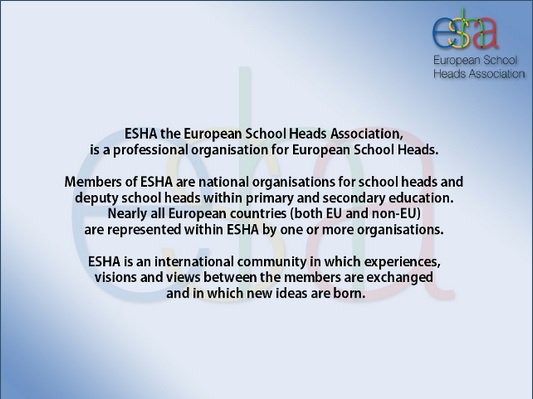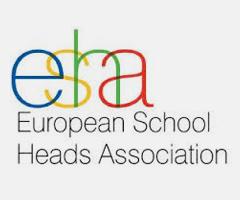esha-dokumenti
OSOS project event report
Partner: ESHA
Date: October 14, 2017
Location: Syracuse, Italy
This project has received funding from the European Union’s Horizon 2020
Framework Programme under grant agreement No. 741572
Executive summary
Date: October 14, 2017
Location, venue: Hotel Jolly Aretusa in Syracuse, Italy
Speakers:
-
Fred Verboon / ESHA
-
Rob van der Vorst / Heerbeeck College
-
3 work group leaders
Objective:
In-depth presentation of the OSOS project, its model and approach to open societies to 35 representatives of 25 national organisations of school leadership. The goal is to raise awareness of the OSOS project and to collect good practices in 25 European countries.
The event has been organized by ESHA
Results:
During the event, 35 representatives from 25 countries have been informed about the project. After the project presentation, the Heerbeeck College presented their good practices on Open Schooling. After both presentations, the attendees were split into 5 groups that discussed all of the following questions:
-
Do schools in your country involve external parties like companies, parents, museums, municipalities, etc in the design of the education? And on what scale?
-
Are there any governmental policies related to working together with organisations outside the schools?
-
Do you know of any good practices in this field?
After the group discussions, all 3 group leaders presented the outcome to the whole audiences and further actions were discussed.
The event resulted in:
-
Interesting insight into the countries’ policies
-
Increased commitment of the European Parents Association. Their president Eszter Salamons participated in the meeting
-
Many positive reactions from the school heads associations
-
Very interesting good practices
Table of contents
Executive summary .......................................................................................................................................................... 2
Table of contents ................................................................................................................................................................ 3
-
Agenda ......................................................................................................................................................................... 4
-
Photos and video coverage ................................................................................................................................. 5
-
Outcome of the discussions ................................................................................................................................. 6
-
Event attendees .................................................................................................................................................... 10
|
1 |
Agenda |
Please include the agenda and the meeting notes (high level abstract of the content, no more than 15- 20 lines of text)
The agenda of the event was:
09.00 - 09.25 Welcome
09.25 - 10.00 Open Schools for Open Societies: introduction
10.00 - 10.45 An inspiring Open School: The Heerbeeck College
10.45 - 11.00 Please fill in the OSOS form
11.00 - 11.20 Get a cup of coffee
11.20 - 12.50 Group discussions in three groups
12.50 - 14.00 Plenary feedback and conclusions
14.00 - 14.20 All other business
14.20 - 14.30 3 Things to share with your neighbor
|
2 |
Photos and video coverage |
|
|
|
3 |
Outcome of the discussions |
The following three questions were discussed by the groups during the break outr sessions:
-
Do schools in your country involve external parties like companies, parents, museums, municipalities, etc in the design of the education? And on what scale?
-
Are there any governmental policies related to working together with organisations outside the schools?
-
Do you know of any good practices in this field?
The outcome of the discussions are discussed below:
Do schools in your country involve external parties like companies, parents, museums, municipalities, etc in the design of the education? And on what scale?
No, but some schools work together with parents in changing the schools and the way they deal with kids. The municipalities are involved in primary schools and kindergarten in designing the education. (SMI Iceland)
Yes, it is up to the single schools how they work with surrounding companies and institutions (ASD Germany)
Not at the school level for secondary education. But it does happen at the region and state level. They work on partnerships with museums, companies etc. School have to apply to work with these organisations. (ID FO France)
Yes, it varies a lot and it seems that it depends on the school heads and the school owners. (Sec, School Heads Norway)
Yes, School heads in Italy have the authority to establish relations with their neighbourhood. Many schools do that by making the schools facilities (swimming pool, gyms and auditoriums) available for local clubs and youth. Besides that, school usually cooperate with museums.
In Italy students do not only learn in class, they do not grow by just sitting behind the desk. The school-work alternation introduces a new dynamic and active learning format for girls and boys in the last three years of high school. The Ministry of Education has introduced a period (from 200 to 400 hours in the last two years) of company training for each student. At age 16, the time has come to put into practice and measure everything that has been learned by confronting the outside world in a company, a museum, an association. (ANP Italy)
Yes, external groups are involved at schools, however, there is no consistent national approach. Secondary schools are usually more involved than primary schools in this area (NAHT, UK)
Yes, there are primary schools with projects with museums and institutions managed by the Barcelona education Center. They are usually projects involving companies in their neighbourhood. Most of the projects are done in secondary schools especially vocational training where students go to workplaces and learn by practice. (Axia, Catalonia)
No, only some individual schools do it (Serbia)
The majority (50+ %) of secondary schools do promote leadership discussions between CEO’s and school heads together with museums and promote working together starting in primary education in the Netherlands (AVS, TheNeherlands)
Yes, on a large scale. But there is a variation between schools. It is part of our national curriculum: Entrepreneurship education (SureFire Finland)
Yes, it is part of the school law for primary and lower schools to work with music schools, art schools and museums. (Skolelederforeningen Denmark)
Yes, it is part of the new national curriculum that is a skilled based curriculum with focus on learning outside the classroom. (Scotland)
Yes, but only for vocational schools. Parents for example are only accorded to participate in the school at the advisory level. (Belgium)
Not formally. There are some involvements in a number of schools. However, the norm is that parents stay outside the gates of the schools unless invited in by the school authorities (Ireland)
In Slovenia, parents, companies and museums are actively involved in education. Even at preschool, parents help with reading activities and events. (Slovenia)
External companies and institutions are involved on a project based level. iTis not included in the formal curriculum (Croatia)
Are there any governmental policies related to working together with organisations outside the schools?
There are many primary schools working on European projects with all kinds of policies. For secondary schools, the government tries to involve parents because of the decrease in emotional wellbeing of students in Iceland (SMI Iceland)
Yes, if students are outside of the school, they are protected and insured in case of an accident (ASD Germany)
France partnership is obligatory there is an internship for vocational schools. Schools partner with companies in the area and be evaluated. Every student has to spend 22 weeks in three years in companies, for internships. Each school tries to formalize partnerships with companies, in order for students to be able to find an internship. Local districts ( municipalities, regions )are often involved in education, offering scholarships, funding, opportunities to schools on project matching their own goals. Schools and heads are evaluated on the ability to create and formalize partnerships with companies, organizations, institutions. This leads to a debate in France, some wondering if education is still a national matter, or becoming more and more a local/regional one. (ID FO France)
Yes, the new education strategy includes these open policies on a large scale. It is part of the new curriculum. (Sec, School Heads Norway)
The EU policy is to embrace and validate non formal and informal learning. The new Portuguese educational policy is a great example (European Parents
Association)
The law on the autonomy of school leaders make the local cooperations possible (ANP Italy)
Yes, but only focused on vocational education (Axia Catalonia)
No (Serbia)
Yes (The Netherlands)
Yes it is part of the national curriculum in Finland where companies are being gathered and who are paying funding for the association TAT which is organizing the relationships between companies and schools. See website:
http://www.tat.fi/briefly-about-economic-information-office/
(SureFire Finland)
In the UK, there is a program in which primary schools can access the database to find examples of companies coming in to schools to present and learn about job experience. (NAHT, UK)
The national curriculum promotes learining experiences outside the classroom However, these are sometimes limited due to insurances issues and child protection issues. An internship for two weeks in secondary schools is obligatory.
(AHDS, Scotland)
Yes, however limited to vocational schools (VLVO Belgium)
No, however, we do see some involvement of companies in the areas of STEM .
Companies and universities are working hard to increase the number of female STEM students. Furthermore, all students have the option for a transition year at age 15-16 when they do not have to attend school for a whole year. During that year young people can have a job, find internshipsm etc. About 80% of young people do it (Ireland)
No, it is up to the individual school. However, all activities with outside organisations should be a part of the annual school plan that needs to be approved by the school board and the school council. (Slovenia)
In France all students go on internships for 1 week in secondary schools. These relations are managed at regional and state level. There are many intership periods (up to 22 weeks a year) for VET students. (France)
In Italy is time to learn by doing, realizing, taking on little responsibility and great satisfaction, living in work contexts where students are dealing with older people and preparing for tomorrow, knowing better their ambitions and understanding how to make them real. The Ministry of Education in the last year has entered into conventions with many companies to accommodate students who practice work after the morning lessons. (ANP, Italy)
Do you know of any good practices in this field?
Yes: Time is out! (SMI Iceland)
The vocational schools are very successful. We call this dual education They are working in the companies 3 days and 2 days at school (ASD Germany)
Entrepreneurship: There are organisations that help students create companies Region Ile de France: helps students to see 3 movies a year (classical, historical) and trains teachers on that / some schools have a cultural mediateur to facilitate teacher projects (ID FO France)
There are many good practices in Norway. The most important one is UNHG Entreprenorskjap www.ue.no. A second one is called Firga.vgs. There are also many implementations from the Young Entrepreneurship program Norway)
Yes, plenty: Rural community learning centers in Latvia, igazgyougy Foundation in
Hungary (targets Roma children) Fomento Schools, AKG Budapest (European
Parents Association)
There are some programs that were introduced in deprived areas to include the local communities and especially parents with the school of their children. (NAHT
UK)
No (Serbia)
Yes, many. Some examples are: Scholen voor Ondernemend Leren, De nieuwste school in Tilburg, Lourenz Lyceum in Rotterdam, Monderijn in Helmond, Agora school. Brainport schools, (The Netherlands)
Yes, a small company named TAT helps schools in the field of entrepreneurship education. The site ww.tat.fi contains several good practices. (Finland)
Yes; Developing Scotland’s Young Workforce project in Edinburgh. (Scotland)
No, The Belgian system is not flexible enough. (VLVO Belgium)
Yes: work experience: Young Social Innovators. BT Young Scientists, A group of 100 schools called ‘Educate together’ have some forward looking policies. Project names Business in the Community (Ireland)
Many schools involve parents in the organisation of sport days and safe travel path to their schools. (Slovenia)
|
4 |
Event attendees |
OSOS event
14-10-2017.pdf














